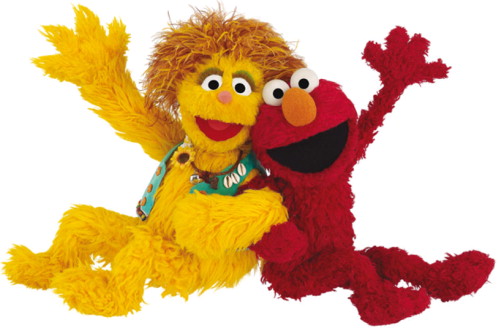
American readers will probably recognize the dopey guy on the right as Elmo, of tickling fame, who lives on Sesame Street. But this isn’t Elmo, it’s his doppelgänger, Neno, who appears on Takalani Sesame, the South African version of the show. The blonde is his co-star, Kami, who will also appear on Sesame Square, a new Nigerian adaptation, slated for launch in March.
Kami is only 5 years old, but she has grown-up problems. When she was an infant, a blood transfusion left her HIV positive. Her mother had AIDS and died, leaving her orphaned.
Her story is tragic, but all too common among her audience. In South Africa, some 1.2 million children are orphaned by HIV/AIDS, and 18.1 percent of all adults carry the virus, according to UNICEF. Despite the prevalence of HIV/AIDS, South Africans have heard many confusing messages about the disease. For example, Thabo Mbeki, who was president from 1999 to 2008, is an HIV denialist: he believes that HIV does not cause AIDS and that antiviral drugs are poison.
To combat this intense stigma against HIV, Kami’s creators made her cheery, adventurous and asymptomatic. Kami — short for the Setswana word Kamogelo, which means acceptance — isn’t afraid to talk about her illness. “Sometimes when you’re ill, you mustn’t keep it a secret, you must tell people,“ she said in one Takalani Sesame episode.
Kami has been controversial since her debut, in the summer of 2002, when Joel Schneider of the Sesame Workshop described her to the attendees of the 14th International AIDS conference in Barcelona. In no time, six U.S. congressmen wrote a letter to PBS expressing worry that Kami would eventually make it into the U.S. version of the show. According to news reports, the letter also noted that PBS receives federal funding and asked how many federal dollars went into the creation of Kami.
PBS buys Sesame Street and airs it, but has nothing to do with making it. The show’s producers, the non-profit Sesame Workshop, quickly responded that Kami was created with South Africa’s needs in mind, and was never intended for an American audience. As for funding, Takalani Sesame is supported by the South African government, USAID and Sanlam Life, a South African insurance company. The new Nigerian show, Sesame Square, will be funded by USAID and PEPFAR.
The congressmen’s main concern, they said, was the age of Sesame Street‘s audience, which is 2 to 4 years old. As a spokesman said to a reporter, “What we are arguing is, isn’t that a little early to subject kids to all the problems and frailties of the human race?”
That’s precisely the point, as misinformation about HIV begins at very young ages. Still, it’s not easy to explain the virus to toddlers. On Takalani Sesame, no one ever mentions sex, drug use or other forms of HIV transmission. The Nigerian version will have other issues. For instance, because the audience in northern Nigeria is mostly Muslim, Kami won’t be hugging her male friends.
I’m not sure why I find Kami so fascinating, but I do. It may be because she represents a creative solution to one of the biggest challenges in public health: spreading accurate and lasting messages about disease.
**
You can read more about health messages broadcast on African television in the February issue of the Lancet Infectious Diseases.
American public health experts are using a similar strategy. Experts in the CDC’s Entertainment Education Program have helped with health topics in hundreds of television scripts. The Kaiser Family Foundation worked with Grey’s Anatomy writers on an episode about mother-to-child transmission of HIV and then studied how it affected the opinions of randomly chosen viewers. Knowledge of HIV transmission increased four-fold after the episode aired.
2 thoughts on “Muppet Messaging”
Comments are closed.